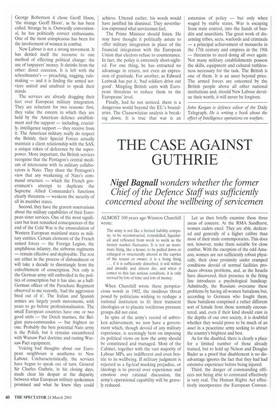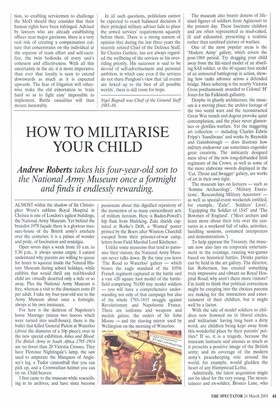THE CASE AGAINST GUTHRIE
Nigel Bagnall wonders whether the former
Chief of the Defence Staff was sufficiently concerned about the wellbeing of servicemen
ALMOST 100 years ago Winston Churchill wrote:
The army is not like a limited liability company, to be reconstructed, remodelled, liquidated and refloated from week to week as the money market fluctuates. It is not an inanimate thing, like a house, to be pulled down or enlarged or structurally altered at the caprice of the tenant or owner; it is a living thing . if it is sufficiently disturbed, it will wither and dwindle and almost die; and when it comes to this last serious condition, it is only revived by lots of time and lots of money.
When Churchill wrote these perspicacious words in 1902, the insidious threat posed by politicians wishing to reshape a national institution to fit their transient ideologies or to placate vociferous pressure groups did not exist.
In spite of the army's record of unbroken achievement, we now have a government which, though devoid of any military experience, is seemingly bent on imposing its political views on how the army should be constituted and managed. Most of the Cabinet, together with the vast majority of Labour MPs, are indifferent and even hostile to its wellbeing. If military judgment is rejected as a fig-leaf masking prejudice, or ideology is to prevail over experience and emotion over rational discussion, the army's operational capability will be gravely reduced. Let us then briefly examine these three areas of concern. At the RMA Sandhurst, women cadets excel. They are able, dedicated and generally of a higher calibre than most of their male contemporaries. This does not, however, make them suitable for close combat. With the exception of the odd Amazon, women are not sufficiently robust physically, their close proximity under cramped conditions devoid of normal facilities produces obvious problems, and, as the Israelis have discovered, their presence in the firing line introduces a psychological handicap. Admittedly, the Russians overcame these problems by having all-women battalions but, according to Germans who fought them, these battalions comprised a rather different sort of female from those normally encountered, and, even if their kind should exist in the depths of our own society, it is doubtful whether they would prove to be much of an asset in a peacetime army seeking to attract the country's brightest and best.
As for the disabled, there is clearly a place for a limited number of those already trained, but to hold up Nelson and Douglas Bader as a proof that disablement is no disadvantage ignores the fact that they had had extensive experience before being injured.
Third, the danger of commanding officers not being able to command effectively is very real. The Human Rights Act effectively incorporates the European Conven tion, so enabling servicemen to challenge the MoD should they consider that their human rights have been infringed. Advised by lawyers who are already establishing offices near major garrisons, there is a very real risk of creating a compensation culture that concentrates on the individual at the expense of team effort and self-sacrifice, the twin bedrocks of every unit's cohesion and effectiveness. With all this uncertainty in the air, it is more imperative than ever that loyalty is seen to extend downwards as much as it is expected upwards. The fear of litigation will otherwise make the old exhortation to 'train hard so as to fight easy' impossible to implement. Battle casualties will then mount inexorably. In all such questions, politicians cannot be expected to reach balanced decisions if their principal military adviser fails to place the armed services' requirements squarely before them. There is a strong current of opinion that during the last three years the recently retired Chief of the Defence Staff, Sir Charles Guthrie, has not always regarded the wellbeing of the services as his overriding priority. His successor is said to be devoid of self-advertisement and personal ambition, in which case even if the services do not share Pangloss's view that all events are linked up to the best of all possible worlds', there is still room for hope.
Nigel Bagnall was Chief of the General Staff 1985-88.















































































 Previous page
Previous page